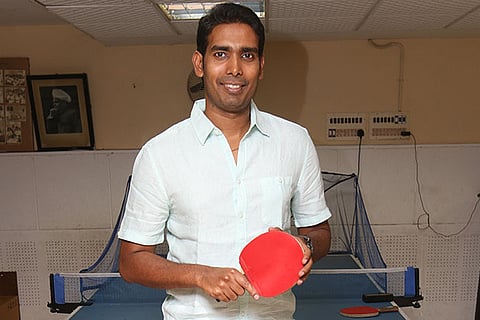

Chennai
Table tennis and Achanta Sharath Kamal are the best possible synonyms the game could ever see in the country. The 34-year-old Chennai paddler has ruled the roost for more than a decade and inspired many to take up the game. Proving that age is no barrier to excel in the sport, the top-ranked Indian paddler triumphed in the senior nationals for the seventh time and finished in the top-four at the prestigious Indian Open.
It wasn’t a surprise for Sharath to take up table tennis. His father A Srinivasa Rao and uncle A Muralidhara Rao are international coaches and have churned out champions from time immemorial.
“He had no option. I was busy with my office work and then I had my club (AKG Table Tennis Academy at the Nehru Stadium). Sharath was one year old when we commenced operations in the club and it was just natural for him to be there always. He didn’t have any inhibitions. He picked up the game fast. Table tennis was in his mind even before he started playing,” his father Srinivasa Rao said.
Sharath’s uncle Muralidhara Rao added: “He didn’t have a choice. Sharath could have been talented in other ways, but we didn’t explore any as our focus only revolved around table tennis and fortunately he took an instant liking to the game.”
The table tennis doyen loves meeting budding players and encourages them to excel in the sport. In an interaction at the Mylapore Sports Trust Table Tennis Academy, the Arjuna Awardee shared his views on the game and fielded a rally of questions from the enthusiastic children.
(A Sharath Kamal with his father, uncle (both national level coaches), Meenakshi Ganapathy (coach), the management and trainees of Mylapore Sports Trust Table Tennis Academy)
How was it to win the senior nationals for the seventh time?
I haven’t won the Indian national championship in the last five years (he was most of the time in Germany playing the league). So, I wanted to win this not to prove a point to anyone but to let myself know that I am still in the thick of things. I prepared for this a lot, I started early and fortunately things went my way. And like all other players, I love winning and I am elated.
You were trailing 1-8 down in the third game but managed to hold (Soumyajit) Ghosh off and take the game. What did you do differently?
I realised I was missing many easy balls. I found out a way to break his strategy and started closing points faster. Once I started scoring and winning points, my confidence grew and I scored nine points to make it 10-8 in my favour and closed the set at 11-9. It was just perseverance and doing the right things
You lost to a 13-year-old in the semi-final of the Indian Open. What went wrong?
He (Harimoto of Japan) is a junior World Champion. The match was close. He played very well and closed out points in an expert fashion. It proves that age is never a criterion. It is always the level of the game that matters. Harimoto has once again proved that it is all about preparation and playing well. He puts in 12-13 hours a day on the table. It all boils down to practice and how you play.
Who was your role model?
It kept changing. While growing up, it was the state number one. A player always looks up to someone as you need idols. Then it was the India number one and then Timo Ball, World No. 1 was my favourite as I grew up the ranks. But it started through Chetan Baboor (the former Indian national champion), who came to my father’s club (AKG) and started talking. I was one among the enthusiastic listeners in the crowd and that inspired me more to excel in the game.
What advice do you give to parents of young players?
Patience. That is the magic word. We are used to seeing parents wait for years to see their children become engineers and doctors but won’t wait for more than two years to see if their child can become sports champions. We must wait and support children. I first played for India when I was 19. I was good at the state level but lacked the cutting edge to be good in the national level. But, my uncle and father had the faith in me. At 20, I became the national champion for the first time and the following year, I played the Olympics and won the Commonwealth Championships. The aim was always high — to be a good international player. Within six months, things changed and that was possible only because they had the faith in me.
How do you keep the motivation going when you keep losing?
No-one likes to lose. Everyone likes to win. I felt sad when I had a string of losses. When I lost, all I remember was feeling bad but somehow I ended up getting back to training the next morning. I lost a match after having four match points and you can imagine the kind of heartbreak it would have caused. The minute you lose, it is an indication that one needs to work harder. If you realise this fact, things are for the good.
How can children balance studies and the game?
It is no rocket science. For sportsmen, the ability to focus is always high. Once your concentration levels improve, the question of balance doesn’t come as you automatically start to register what is taught in class. Nowadays, schools have sports in their curriculum too and that is an added advantage.
FACT FILE:
Visit news.dtnext.in to explore our interactive epaper!
Download the DT Next app for more exciting features!
Click here for iOS
Click here for Android